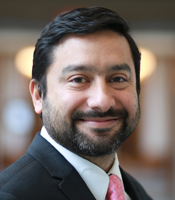In a case brought to light by the International Human Rights Clinic at the University of Virginia School of Law, the Supreme Court of Honduras overturned the convictions of six environmental activists that drew the ire of the international community.
In 2018, eight environmental activists in Guapinol were arrested after setting up a camp to protest an iron ore mining project in Carlos Escaleras National Park that threatened the village’s water supply. The community denounced the mining company and its allied security forces had instigated violence against the protesters.
“The innocent defendants spent more than two years in pretrial detention while the prosecutor had no proof of their culpability for the crimes of which they were accused,” said Professor Camilo Sánchez, the clinic’s director.

In September 2020, the clinic published a report detailing the factual background of the case and provided a legal analysis of the situation, the history of violence and harassment of human rights defenders in Honduras.
At the time, this was the first report by an international organization on the case, according to Sánchez, and the report brought the issue to the attention of other international organizations and governments.
Members of Congress cited the clinic’s report in a letter asking the U.S. State Department to pressure Honduras to protect human rights and the defenders. Subsequently, the United Nations and Amnesty International confirmed information in the clinic’s report.
The Honduran Supreme Court’s Constitutional Chamber unanimously sided with the defendants and threw out their case on Feb. 10, the day after six protesters were convicted. Two had been acquitted.
“The defenders were tried, for example, by a court with jurisdiction over serious crimes, explicitly created in Honduras to combat organized crime gangs,” Sánchez said. “The court found that this violated defendants’ right to a fair and public hearing by a competent, independent, and impartial tribunal established by law. Consequently, the case must go back to the beginning of proceedings for a competent judge to remedy these procedural violations.”
For the past three years, the clinic has partnered with the American Bar Association Center for Human Rights, especially the center’s section in charge of trial monitoring. For example, through another ABA referral, the clinic produced research aimed at protecting gay men from being persecuted in Nigeria.
“The ABA received a request to monitor the trial from the Guapinol community,” Sánchez said. “They invited us to monitor the proceedings, given the importance of addressing a pervasive pattern of harassment of human rights defenders in Honduras.”
Students in the yearlong clinic gain first-hand experience in human rights advocacy, working in partnership with nongovernmental organizations, human rights practitioners and law firms in the United States and abroad.
Katherine Krudys ’22, who drafted an amicus brief on behalf of the Guapinol community with Kathryn Neuhardt ’22, said clinic students helped draw attention to the case through updates, letters to lawmakers and amicus briefs in cooperation with local and international advocates and lawyers. She said she’s thankful that Sánchez provided the opportunity for her to have a broader picture of human rights work.
“Throughout the process, I witnessed how many human rights organizations became involved, so for the human rights community this victory is a recognition of all that cooperation,” said Krudys, who will work at White & Case in Washington, D.C., after graduation. “While this victory came as a surprise, those involved with the case pursued every avenue possible to arrive here.”
Monique Alavi ’23 and Matt Walchuck ’22 drafted two amici briefs for the Honduran Supreme Court. The first brief argued that some of the legal arguments used by the prosecution to keep the defenders in detention violated their right to certain international judicial guarantees. The second brief focused on deprivation of liberty because the group was arbitrarily detained, according to internationally determined guidelines.
“We got great firsthand exposure to the process of drafting work products while balancing the interests of other international organizations and the circumstances of an ever-evolving case,” Walchuck said.
Walchuck, who will work at Linklaters in New York after graduation, said he hopes the win signals that accountability and social justice are increasingly influencing how governments govern and corporations do business.
“For me personally, it feels great to have a win after participating in clinics for three straight semesters,” he said. “It feels even better to have played a role in the liberation of a group dedicated to protecting the environmental health of their community.”
Founded in 1819, the University of Virginia School of Law is the second-oldest continuously operating law school in the nation. Consistently ranked among the top law schools, Virginia is a world-renowned training ground for distinguished lawyers and public servants, instilling in them a commitment to leadership, integrity and community service.


